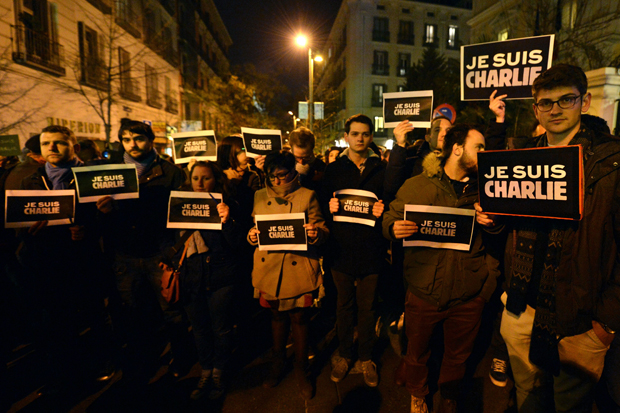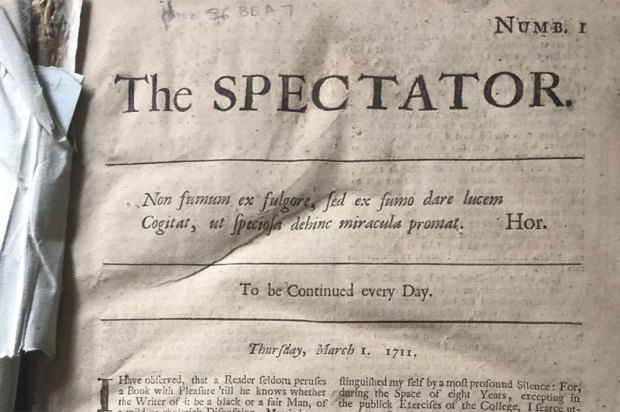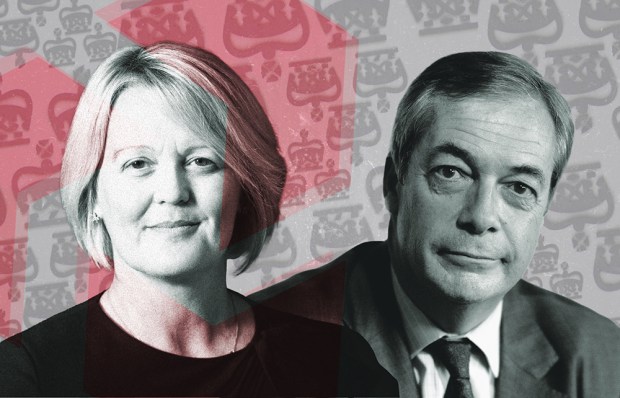The French satirical magazine Charlie Hebdo lambasts, attacks and lampoons absolutely everybody. Its targets include all religions, all identity groups, minorities and majorities. In recent years it has been most prominent for its refusal to apply different treatment to Islam. It knew that carrying on with satire, in the name of free expression, carried a real danger — its office in Paris was firebombed three years ago on account of this, and it still carried on with its irreverence.
On Wednesday morning, two gunmen went into the magazine’s office wielding Kalashnikovs and rocket-propelled grenades. Within minutes, 12 people were reported killed. The gunmen’s identity was unknown when The Spectator went to press, but there was not much doubt about what had happened.
When in 2005 a Danish publication published cartoons depicting the Prophet Mohammed, there were riots, lootings and assassination attempts in Denmark and around the world. Nearly all the western media took the lesson of intimidation and refused to run cartoons which might be seen to be critical of Islam. Charlie Hebdo stood almost alone against this. Since that date, it has published many cartoons and caricatures of Mohammed. It has appropriately and justly ridiculed Isis — indeed the last cartoons sent out on Charlie Hebdo’s Twitter feed before the attack was a cartoon of the purported ‘Caliph’ of the self-styled Islamic State, al-Baghdadi.
Whatever the identity of the attackers — whatever their religion or political affiliations — it must be stressed from the outset that however robust the magazine’s position, its journalists did not ‘bring it upon themselves’ or ‘provoke’ their attackers. All blame must be directed at the people who perpetrated this disgusting act and at those who believe that it is acceptable to explain away such intimidation, violence and thuggery. And the response of free peoples and the free press should be appropriately unified.
In Britain and across the western world, the free press has been under attack from many directions in recent years. But the form of attack threatened by the perpetrators of Islamist violence poses the most virulent threat of all. What its extremists have been trying to do in recent years is to put one belief system, one religion and one historical figure in particular beyond criticism, beyond investigation and beyond free speech.
It ought to be added that the attacks on Charlie Hebdo are also an attack on Islam — and will bring revulsion from the Muslims appalled that such barbarity could be carried out in the name of their religion. After the 2011 firebombing, Mohammed Moussaoui, head of the French Council of the Muslim Faith, said his organisation deplored the magazine’s treatment of Islam ‘but reaffirms with force its total opposition to all acts and all forms of violence’.
It is the duty of all free people and all free media to respond robustly to this outrage. To show that we will not treat any people of any belief or background in our societies any differently from others. To show that freedom includes the freedom to speak freely and to offend. The stake, for all our societies, could not be higher.
As Daveed Gartenstein-Ross says on page 14, making headlines with shock tactics is how Isis has sought to persuade the world that it’s winning — but let’s remember: it’s not. Just as the Taleban’s killing of 132 schoolchildren in December in Pakistan proved counter-productive, as Pakistanis and Afghanis recoiled in horror at their brutality, so such an extreme attack on the innocent will backfire. Shocking violence is the resort of the desperate. In the end, they will lose.
Got something to add? Join the discussion and comment below.
Get 10 issues for just $10
Subscribe to The Spectator Australia today for the next 10 magazine issues, plus full online access, for just $10.
You might disagree with half of it, but you’ll enjoy reading all of it. Try your first month for free, then just $2 a week for the remainder of your first year.














Comments
Don't miss out
Join the conversation with other Spectator Australia readers. Subscribe to leave a comment.
SUBSCRIBEAlready a subscriber? Log in